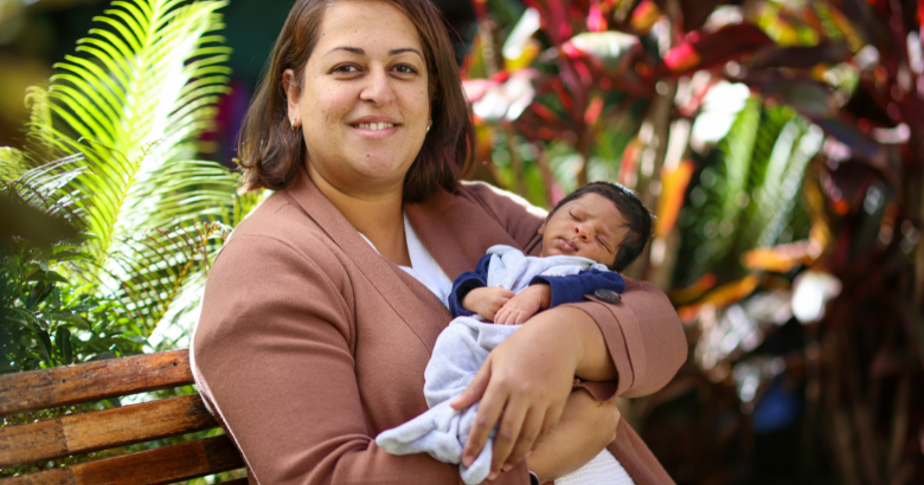
Families who have experienced the loss of an unborn baby or fertility problems are being given new hope of becoming parents thanks to cutting-edge research funded by a $500,000 donation from The Lott by Golden Casket.
The donation to Mater Foundation will fund a new study of DNA at Mater Research that aims to shed light on the devastating “black box” of unexplained pregnancy loss and infertility in mothers.
The project will be led by Mater Research Group Leader of Developmental Molecular Genetics Dr Sandy Richardson, who said pregnancy loss was a heartbreaking experience for women and their families.
In Australia, one in six couples experience infertility problems and one in four pregnant women under the age of 35 will suffer a miscarriage. For women over 40 the risk of miscarriage increases significantly, with one in every two experiencing the loss of an unborn baby.
“Most of these tragic cases go without a satisfying explanation – we still have much to learn about the underlying causes of reproductive dysfunction,” Dr Richardson said.
Dr Richardson said researchers will study how mobile DNA elements, or “jumping genes”, can cause harmful changes, known as genetic mutations, during the development of an embryo. Her team will investigate whether these mutations contribute to infertility and pregnancy loss.
“The embryo in the very earliest days of pregnancy is one of the most vulnerable stages of human life,” Dr Richardson said.
“Jumping genes are like selfish genetic parasites that can move around in our genomes and cause harmful changes to our DNA sequence. They are especially active in embryos in the first few days of pregnancy. We want to know if their activity is responsible for a substantial proportion of unexplained pregnancy loss.
“We aim to discover how our cells naturally defend themselves against these selfish jumping genes, and what happens to a developing embryo when these defences fail. We also want to understand whether some individuals may be genetically predisposed to jumping gene mutations, and whether environmental exposures play a role in jumping gene activity.
“We believe that jumping genes may hold the key to explaining and perhaps ultimately mitigating a significant proportion of reproductive struggles.”
Brisbane mum-of-two Ramona Harvie appreciates the guilt and trauma that mothers suffer through miscarriage after she lost a baby at just seven weeks.
She spent years trying for a sibling for her four-year-old daughter Tessa, and although she recently gave birth to beautiful baby son Diyon at Mater Mothers’ Hospital, she knows the pain of losing a baby will never go away.
“There are so many thoughts that you go through your mind, like was there anything I did wrong? Why is this happening to me? Will I ever get my second child?” Mrs Harvie, 39, said.
“I hope that this research may take the burden off mothers who are questioning themselves or wondering if they could have done anything differently.”
Dr Richardson said funding from The Lott by Golden Casket will enable Mater researchers to use the latest DNA sequencing technologies to answer those questions.
“For a lot of women, early miscarriages are treated as ‘something that just happens’. There is a lack of research about pregnancy loss in the early stages,” Dr Richardson said.
“We are hoping to provide a satisfying explanation for an increased proportion of pregnancy losses. If we discover genetic or environmental factors that increase jumping gene activity in embryos, this may open the door to strategies for prediction and prevention of miscarriage.”
The Lott by Golden Casket Partnerships Manager Ally Ramsamy said she hoped the donation would make a real difference to couples looking to start and grow their families.
“As an expectant mother myself, I know all too well about the fear of infertility and pregnancy loss that families may face,” Ms Ramsamy said.
“The statistics surrounding infertility and miscarriage are devastating, and to experience either of these is truly heartbreaking.
“We’re honoured to know our donation will help to understand these issues so one day they can ultimately reduce them from occurring.”
Another project to receive funding, led by Mater Neonatologist and Researcher Dr Jasmine Antoine, will look at ways to enhance proficiency in newborn intubation through improved training techniques.
“Needing unplanned neonatal intubation is rare and that it’s need is not predictable, but when needed, it has to be performed as quickly as possible,” Dr Antoine said.
“It’s technically challenging to perform and so increasing the number of medical professionals trained in this technique will mean a competent person is close at hand when this critical lifesaving intervention is needed.
“This research will look at different ways to train clinicians in becoming more proficient in intubating babies at the time of delivery, including different methods in simulation.
“Very few babies require intubation soon after being born, but it’s a life- saving event and we want to ensure that key health professionals, including GPs and obstetricians, are as prepared as they possibly can be.”
Mater Foundation Chief Executive Andrew Thomas thanked The Lott by Golden Casket for its continuing support of Mater Research’s life-saving and life-changing research projects.
“Every new breakthrough and finding that Mater Research makes is thanks to the funding we receive from donors like The Lott,” Mr Thomas said.
“This hugely generous donation will go a long way towards improving our understanding of miscarriage and fertility issues for families in Queensland – and around the world.



